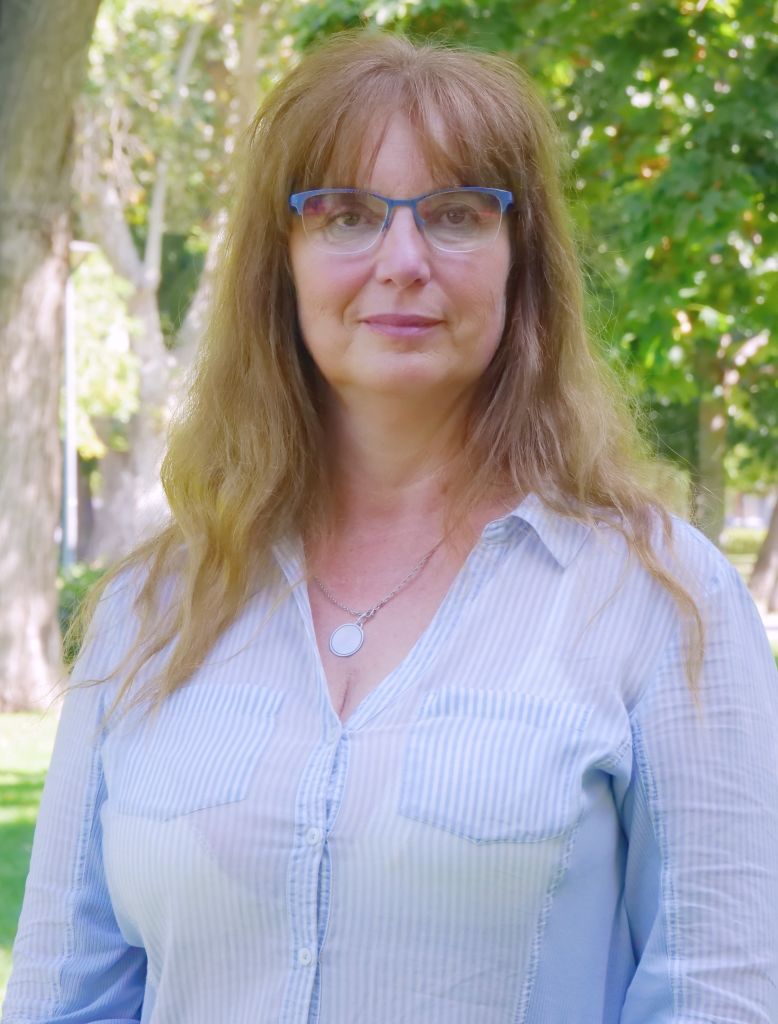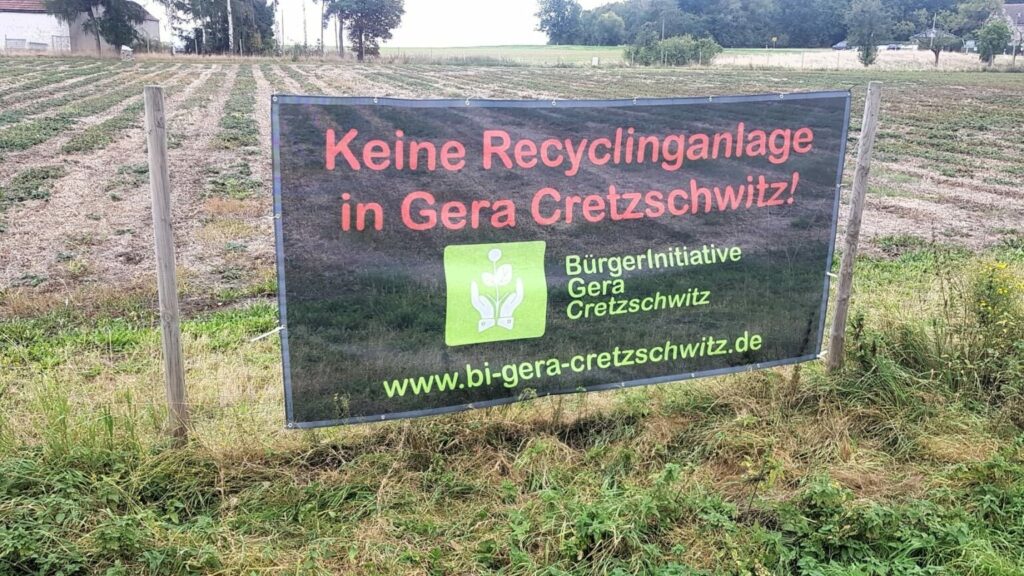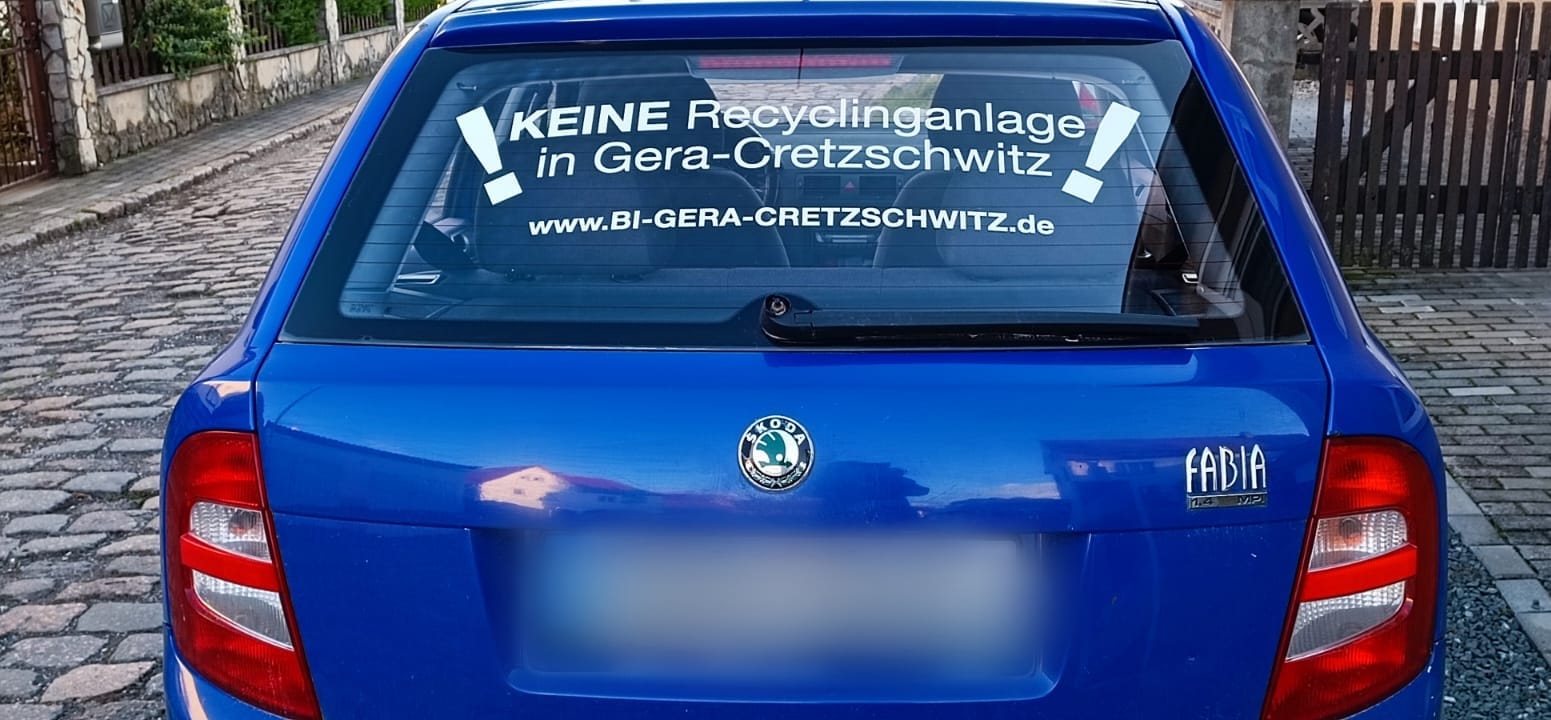The https://english.atlatszo.hu use cookies to track and profile customers such as action tags and pixel tracking on our website to assist our marketing. On our website we use technical, analytical, marketing and preference cookies. These are necessary for our site to work properly and to give us inforamation about how our site is used. See Cookies Policy
Residents in Thuringia protest against SungEel’s battery processing plant
While in Hungary, SungEel’s battery processing plant was allowed to start operations without an environmental and disaster management permit the South Korean company did not even get a permit in Germany. In Thuringia, residents and German experts are blocking the establishment of SungEel Hitech’s battery recycler for the second time, which is causing a serious financial loss for the company.
In Gera-Cretzschwitz in Thuringia, SungEel HiTech Europe Kft. and Samsung C&T Deutschland GmbH plans to open a battery recycling plant with a capacity of 44,000 tonnes annually. However, since last September, the population has been protesting strongly against the plant, with a petition signed by nearly 10,000 people from a local association.

We have previously reported that distrust among German residents is fuelled by news of accidents in Hungary and scandals at the company. Residents outside also claim that a planned battery recycling plant at another German site near Rudolstadt failed because of protests from residents and professional arguments from environmentalists.
The German plant does not get a permit easily
A citizens’ initiative protesting against the planned plant on a new site in Thuringia has said that the dangerous industrial project should not be located near agricultural land or residential areas. Many of the residents of Gera-Cretzschwitz make their living from farming, many of them are organic farmers, and they believe that the new plant would pose a serious threat to their land and their health.
Locals have been well informed about the scandals at the company’s battery processors in Hungary through articles published on Átlátszó and other Hungarian news portals. In their protests, they stress that they do not want the presence of a company with a scandalous reputation, which has been fined several times in Hungary.
However, the plant’s environmental procedure was launched in January. SungEel submitted over 1,000 pages of documentation to the local authority, which was open for comments until April. As a result,
the environmental authority received nearly 8000 comments from the public and experts.
Due to the large number of comments received the licensing authority postponed the public hearing announced for 28 May indefinitely.
As reported in a press release from the town of Gera, the German Environment Agency intends to analyse all the comments submitted, with the involvement of the relevant authorities. The procedure is therefore expected to continue only in the autumn.
The importance of the case is reflected in the fact that several German media have covered the issue in detail. ARD, the German association of regional public service broadcasters, recently published a video report on the case. In addition to the protesters in Thuringia, the report also interviewed politicians and residents of Bátonyterenye and Szigetszentmiklós, as well as a journalist from Átlátszó.
The mayor of Gera is also interviewed in the report. The residents’ protests started after the Gera municipality permitted SungEel to set up the processing plant – but according to the locals, it was done without their consent.
The mayor stressed in the report that he had asked the company to operate in full transparency, to present its plans to the public and only then to start the formal licensing procedure. According to the German mayor, this is the only way to prevent “rumours and legends.”
Fears about waste and accidents
In the interview, residents and politicians from Isarsenszentmiklós and Bátonyterenye talked about SungEel scandals, accidents at work and their fears. Zsuzsa Bodnár of Átlátszó told the German crew that the Hungarian authorities did not provide detailed information on the carcinogen hazards, fires and fines, and did not publish the decisions.
German radio and television station MDR also covered the issue in a podcast. The programme discusses the SungEel accidents in Hungary and the company’s failure to dispose of accumulated waste, which is then stored in several locations without a permit, in an environmentally hazardous manner.
The podcast also features the CEO of SungEel Recycling Park Thüringen Gmb in South Korea. He admits there have been “two accidents” at the Hungarian plants, but says they were caused by “human error” – the shredders were stopped and restarted because of stockpiles. The head of the German subsidiary does not mention the serious risks to workers at the Hungarian plants, the use of false codes for hazardous waste and the irregular storage of waste.
The programme also features an expert from a German battery recycling company. Commenting on SungEel’s licensing documents,
the expert says that he believes the South Korean company is putting much fewer pollutants on the list than will be generated during the waste treatment process.
A 280-page expert report submitted to the authority by environmental experts is also available on the protesting NGOs’ website. It dissects the documentation submitted by SungEel and raises several objections about the amount of pollutants released and the risk factors.
However, it is not only public opposition and the permit issuing is slowing down the establishment of the SungEel plant. The accidents at the battery processing plants in Hungary, as reported by ARD, have shocked and provoked protests from the managers of three other companies in the Gera industrial park.
Several German media, including Thüringen24, recently reported that the heads of a long-established electrical goods company, a paint factory and an IT company had said that if a battery factory in their neighbourhood were given permission, they would close down and move out of Gera. The companies fear financial loss and damage to their reputation, as well as the safety of their workers and families, and have threatened legal action to protect their interests.
South Korean press: ‘growing income insecurity’
The South Korean press has also covered the problems at SungEel Hitech’s overseas plants – the suspension of plants in Hungary and the protests in Germany. In an article published in early May, the Chosun biz news portal reported that the company was facing “growing income uncertainty”. The news portal reports that SungEel’s Hungarian plants had to close last year “due to a series of accidents and environmental pollution problems”.
The forced shutdown halved the company’s sales and the Hungarian subsidiary’s operating loss was reported to be around $7.3 billion. SungEel has also been hit by falling lithium and nickel prices and a “sluggish business environment”. “As in Hungary, the plan to build a battery recycling plant in Germany has been delayed for similar reasons. There is growing local opposition to the project due to environmental and safety concerns about recycling waste batteries.” – writes the Chosun biz news portal.
German and Hungarian authorities work differently
On the one hand, it shows that the irregular operation of SungEel Hitech in Hungary is also affecting German public opinion and is significantly delaying the company’s investment plans.
On the other hand, there is a huge difference in how the Hungarian and German authorities operate. In Germany, it is not acceptable for the authorities to grant permits at “fast-track speed”, to the exclusion of the public, even if the delay harms several interests. Just as a foreign company cannot fail to provide all the information to the public.
It is compulsory to hold public hearings and forums, and all documents must be made public.
On the other hand, the Hungarian authorities just accept the documentation submitted by foreign companies, with virtually no technical objections. Even when there are official controls, the results of these controls and details of irregularities are kept secret from the public, and the public is given almost no say in official procedures.
Written and translated by Zsuzsa Bodnár. The original, Hungarian version of this story can be found here. Cover photo: A protest banner of civic activists in Thuringia against the SungEel battery factory (photo: BürgerInitiative Gera Cretzschwitz / Facebook). The article was produced with the support of the Union Values Programme.
Share:
Your support matters. Your donation helps us to uncover the truth.
- PayPal
- Bank transfer
- Patreon
- Benevity
Support our work with a PayPal donation to the Átlátszónet Foundation! Thank you.
Support our work by bank transfer to the account of the Átlátszónet Foundation. Please add in the comments: “Donation”
Beneficiary: Átlátszónet Alapítvány, bank name and address: Raiffeisen Bank, H-1054 Budapest, Akadémia utca 6.
EUR: IBAN HU36 1201 1265 0142 5189 0040 0002
USD: IBAN HU36 1201 1265 0142 5189 0050 0009
HUF: IBAN HU78 1201 1265 0142 5189 0030 0005
SWIFT: UBRTHUHB
Be a follower on Patreon
Support us on Benevity!


